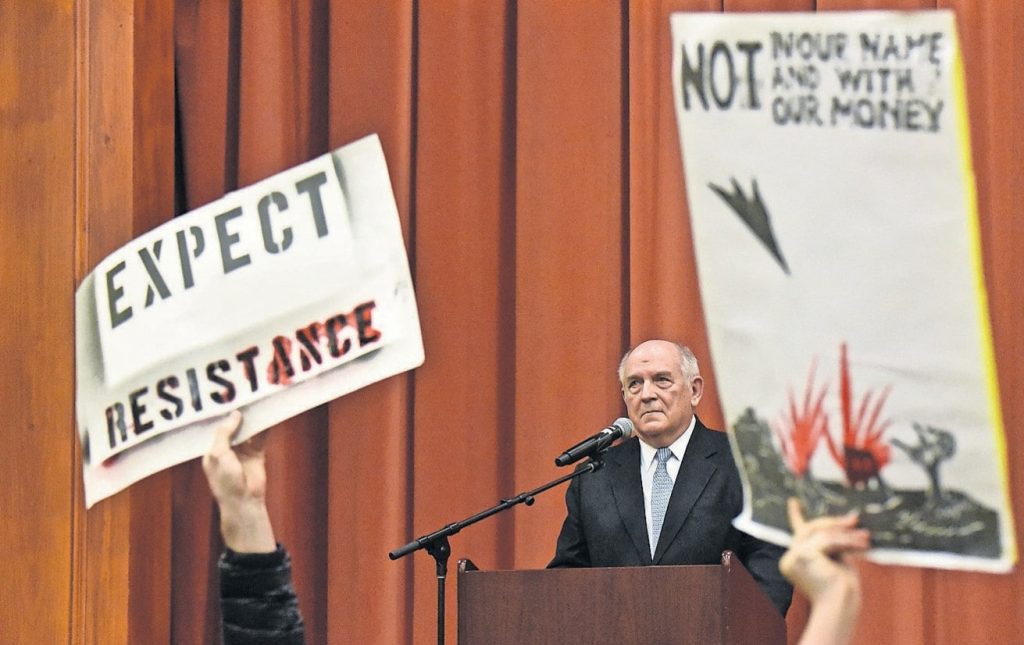
Photo: The Rutland Herald
I’m surprised there hasn’t been more outrage about the somewhat violent silencing of Charles Murray at Middlebury.
I feel more than a little threatened by the fact that a political scientist was actually injured in the line of duty. I thought I had prudently chosen a profession where that just couldn’t happen. As C. C. Pecknold points out, these demonstrations are a kind of ritualized playacting of the privileged, those who think they are somehow reenacting the idealism of the Sixties. The script today is that the threat to our country is now anti-gay white nationalism, and Murray’s work has to be made to fit that script.
But Murray, of course, is a libertarian who refused to support the nationalist Trump. And he’s all about letting people live as they please so long as they productively take responsibility for themselves and their own. Murray often distinguishes, following Hayek, being libertarian and being conservative.
Consider that Murray came to Middlebury to talk about his book Coming Apart as one way of understanding the outcome of our recent election. Well, let me be courageous enough to say I’ve deployed parts of that book in my classes for that very purpose. It contains a lot of outstanding sociology, most of which is both pathbreaking and not really very controversial.
Murray’s least controversial observation, in my view, is that sophisticated and highly productive Americans now inhabit an increasingly impervious bubble. They live in their own zip codes, have their own schools, have developed their own set of values, have seceded from the various civic experiences (such as military service and socioeconomically diverse public schools) that used to bring diverse Americans together, and relate to those not of their kind in a distant, condescending, and manipulative manner. Our elite colleges — despite their official commitment to diversity — are pretty much all part of the bubble.
Related: Middlebury Will Either Defend Democratic Norms or Capitulate
And Middlebury students and faculty could have benefited from Murray’s incisive yet lighthearted description of all their bubble’s distinctive prejudices. They could have gotten more than a bit ironic about themselves. There’s little in Murray’s description of the complacency of the privileged few that wouldn’t benefit Sanders voters as much as or more than it would Trump enthusiasts. It might help Clinton supporters even more in seeing why ordinary Americans, including “skilled labor,” thought of their candidate as lacking in real virtue and indifferent to their struggles.
Who can deny that the basic experiences of ordinary life for Trump voters and Clinton voters are now so different that it makes sense to talk of two alternative realities or bubbles? And that each bubble can be incisively criticized from the perspective of the other. And that each bubble is so protective that Americans are in some way less ironic than ever about their class-based limitations. It’s hard to admit that ours is not so much a middle-class country any longer.
Murray observes that our meritocracy based on productivity typically talks Sixties liberationism and social justice and might even join in demonstrations and other forms of activism in college. But its members’ actual ways of living after college are pretty bourgeois. They develop the habits of highly effective people, including child-centered marriage and assiduous health-and-safety regimens.
There really is a lot to admire in the way they live, even if they’re weak in connecting their privileges to civic responsibilities and living in the whole truth about who each of us is. Their education serves them well on one front, but not on others. Murray also notices that the habits of worthwhile work and healthy living are disappearing from the bottom 50 percent of Americans. He’s right on that. He’s wrong, I think, that they can be restored to middle-class responsibility through the removal of welfare dependency.
The problem is much more complicated than that. It has to do, in part, with the real disappearance of jobs that provide the secure wherewithal to live with dignified relational responsibility and that provide the satisfaction that comes with worthwhile work well done. There might have been a great debate at Middlebury between Bernie supporters and libertarians over that issue, an issue over which reasonable people can disagree. And that debate might have allowed the bubble men and women at Middlebury really to think as citizens about what’s best for all Americans.
Related: Charles Murray on Why He Was Silenced at Middlebury
All in all, Middlebury seems unreasonably resistant to the kind of liberal education that comes with questioning one’s own cherished opinions and forms of pride or self-esteem. That comes with curbing anger through really reading with an open mind the serious and well-intentioned books of those not of their kind. Let me add: I don’t deny that the students’ idealism is a real, if misguided, attempt to find meaning on campus in the only way that seems available. It’s just that they’re ending up reinforcing rather than disrupting or even popping their bubble.
As William Deresiewicz wrote in The American Scholar: “Unlike the campus protesters of the 1960s, today’s student activists are not expressing countercultural views. They are expressing the exact views of the culture in which they find themselves (a reason that administrators prove so ready to accede to their demands). If you want to find the counterculture on today’s elite college campuses, you need to look for the conservative students.”
Reprinted with permission from National Review’s Online blog, The Corner
Splendid piece, Peter.
The old leftist faculty of the 60s and 70s trained today’s tenured racial, who teach students like those in the Middlebury mob that there is no need to tolerate idea if they come from someone who is in the enemy tribe — that is to say, non-progressives.
What will the academy be like once these current students have taken over?